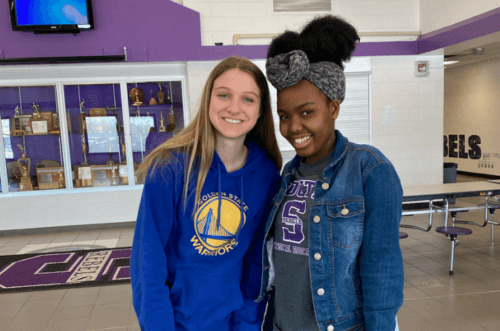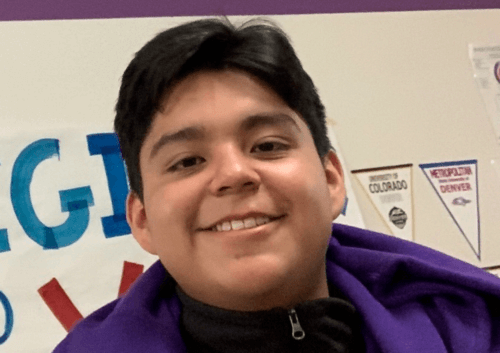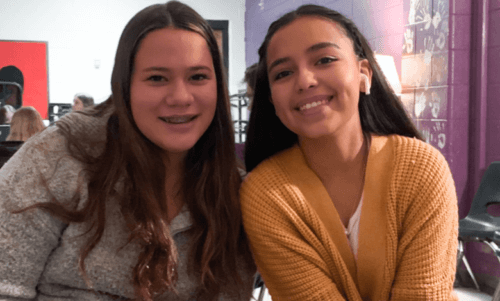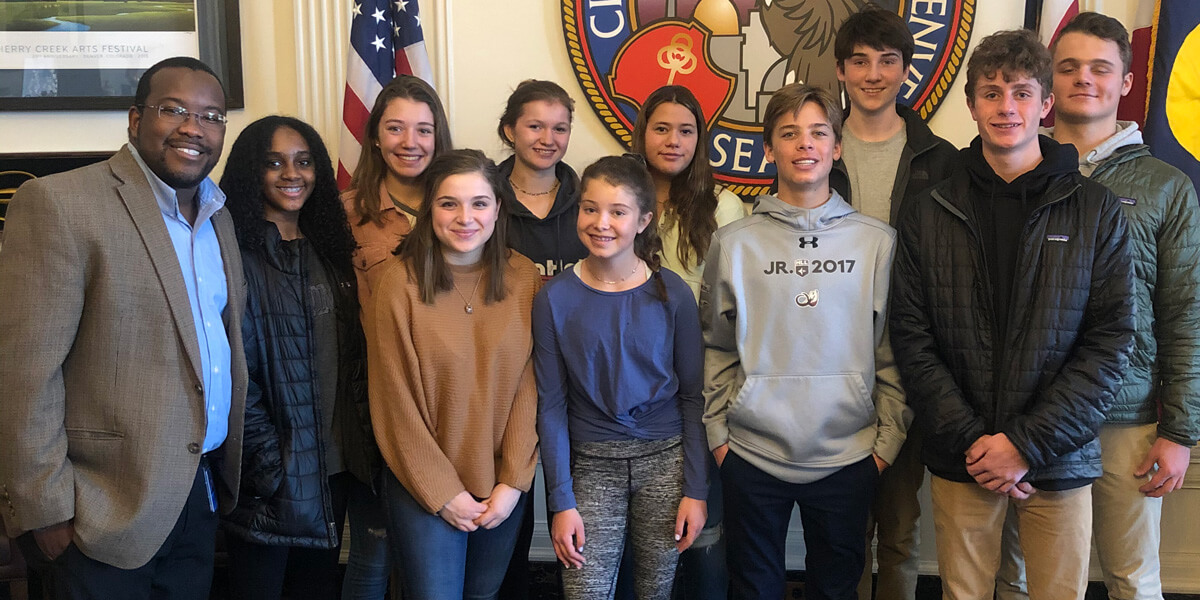Editors note: Each year, Freshmen in Colorado Academy’s Upper School take the Ninth Grade Intensive, spending one week during the Winter term doing an in-depth study of one real-world topic. This year, as it has been for the past several years, the topic was immigration.
In the “Journalism and Immigration” Intensive, students led by Upper School Principal Dr. Jon Vogels and English teacher Mike Stanitski participated in a variety of experiential activities, culminating with a trip to South High School, where CA students were paired with immigrant students whom they shadowed for a day. They also wrote profiles of the South H.S. students, exploring how and why these students made the journey to a new homeland.
These excerpts from some of their profiles show how much learning takes place when students focus on one topic with current relevance, making connections with real-life experiences.
Opening up her Borders, by Ava Geisler

When I initially met Doha Hussain, she greeted me with a warm smile and a hug. She looked happy; her makeup was done and her clothes were popular among today’s standards. Yet, behind the beautiful eyes and perfectly curled hair lies a different story, one of suffering, segregation, and distrust.
Doha’s parents first immigrated to the United States from Iraq after their forbidden love became dangerous. One parent was part of the Shia religion and the other Sunni Islam. These two religions were in a war against each other, and when they started a family, her mother’s brothers burned her father’s car. In 2009, their lives were threatened, and Doha’s parents fled the country with her and six older siblings.
The first step from Iraq to the United States was through Syria. Doha remembers crossing the border and fearing for her life. She said to me, “My dad, he has like a sixth sense, and he knows when something is off. When we were crossing the Syrian border, my dad wanted to do it at night, because of the militias. He said it was better to go the long route than be in danger because of the militias. If they caught us we would all be killed.” Miraculously the Hussain family made it through into Lebanon by walking the entire desert and getting a ride through only a short part.
Doha describes herself as a loner, but not for an obvious reason. She struggles with trust issues and is wary of every single person she talks to. When talking about her journey here, she mentioned, “To gain someone’s trust, we had to bribe them. It wasn’t malicious or anything, that’s just how it works.” As she continued to grow up in the United States, people would stereotype her as soon as they heard her last name (Hussian, which is also the last name of the famous terrorist Sadaam Hussain) and see her mother’s hijab. She describes that moment like “the flip of a switch” or “the look.”
She finds it nearly impossible to trust people and open herself up to them. All she wants is to be accepted, yet she wholeheartedly believes that, “You should never have to change who you are.” What is her solution? Where is she supposed to go to feel safe but still belong? Even Doha herself doesn’t know the answer.
The Difficult Journey, by Olivia Marx

When I first met Alliance, a 17-year-old from Rwanda, she greeted me with a welcoming smile and a hello. She appeared to be your average American teenager. She was dressed like many other teenagers; she spoke and acted like most teenagers I know. She was extremely well adapted to America and it seemed as though she had lived here her whole life. But, this transition to America did not come easily. With it comes a story, one of loss and hope, the story of how a young girl travelled across the world in search of a better life.
When living in Rwanda, Alliance and her family were refugees. Her mother was born in Congo, but Alliance was born in camp. Her life growing up was extremely difficult. “In camp you cannot go to work, you cannot do anything. You just sit there and wait for the UN to bring the food,” Alliance explained to me through tears. Coming to the U.S. was a decision made by her family in search of a better life. They longed to escape the sedentary life they had in Rwanda, trapped in camp. They travelled to the U.S. unsure as to where they would live or how they would adapt to this new lifestyle, but they travelled with an abundance of hope.
Although the journey was extremely difficult both physically and emotionally, Alliance and her family are proof that immigrating to America brings opportunity and life. “I came here with two sisters, and now, I have three,” Alliance tells me with a smile beaming across her face. So, not only did immigrating bring them a better life, but it also brought a new life into the world. To Alliance, the journey was well worth it.
Alliance came to the U.S. knowing no English whatsoever. Part of the reason why she went to South High School was because they have many programs that can teach people English from square one. Alliance admits, “I came here with nothing, I didn’t know any words.” But now, after being in Colorado for only two years, she is able to speak English extremely well, and is very proud of how much she has learned.
A Beautiful Future, by Davis Frankum

Ruben, a 16-year-old sophomore who attends South High School, is very interested in his school work and other hobbies such as friends, sports, and loves to talk about his work outs. Ruben has a mom, dad, sister, and brother who all sought asylum in the United States. He is fluent in Spanish, English, and is now working on French.
Ruben was pushed out of Mexico City due to harsh violence, gangs, and other violence that put Ruben and his family in danger. His family was currently being threatened at the time. Ruben was only 12 at the time. His family decided to cross the border the year of 2016. At one point in his journey he was held in a detention center for five days. Ruben said “It felt like I was in jail”. He also said how sad and depressing it was not to see civilization or sunlight for that amount of time. Now since he has crossed the border his whole family is thriving in America.
Now in Denver, Ruben’s happy and thriving and pursuing a beautiful future. As Ruben told me, in Mexico he couldn’t sleep because of his lack of security at his home. As Ruben started to show emotion I asked him one of my final questions in the interview which was If he has ever felt discriminated against. He quietly talked to me in an emotional tone about how sometimes he feels people look down on him because of his race. As Ruben says “it hurts my performance thinking that people underestimate me because of my race”. It hurts him because it doesn’t help him as he strives to be a better person everyday. It hurts me to see it, too, because he is a very lively and energetic person.
U.S. Born Immigrant, by Liana Fagelson

Carolina was born in El Paso, Texas making her a US citizen. Her parents wanted her to be able to have a better life and not have trouble when they decided to move to the United States. Carolina and her mom went back to Chihuahua, Mexico right after she was born to meet her dad. She lived in Chihuahua until she was three and then she moved to Nebraska with her mom, dad, and younger brother. When she was four her whole family moved to Denver, Colorado and she’s lived here since. She mentioned she had a couple cousins living in Kansas, but other than that, her family is back in Chihuahua.
Mexico is known to not be the safest place especially for a growing family. Between the drug-cartels and gangs, many families want to get away from all that and make a better lives for themselves. In Carolina’s case, it was much easier for them to start a life here because Carolina’s grandma had married a U.S. citizen and Carolina is a U.S. citizen. Her family, just like many others, wanted a better life for their kids and to get them away from the danger that sits just across the border.
Carolina is very proud of her dad and all he has done for her family. Carolina remarks, “My dad didn’t want people telling him what to do.” I had to think about this for a little, but I think that what she meant by this is, her dad wanted to be able to run his own business and work to the top. Her family came to the United States for new opportunities. Carolina looks up to her dad’s work ethic. Today her dad is a successful general contractor and continues to make his family proud.
Fitting In, by Toren Knepper
Vamara is an 18-year-old senior at the most diverse high school in Denver, Colorado: South High School. He was originally born in the Ivory Coast and moved to the United States at the age of 13.
Vamara’s mother had moved to the United States in 2011 and gained citizenship along with other family members. Vamara had to live in the Ivory Coast for many years without his mother, which was tough on him. Finally, Vamara flew to the U.S. by himself, which involved many layovers in foreign countries and a travel time of more than 24 hours. His biggest challenge was the process of gaining citizenship. It took his mother over four years to become a citizen and it took him 3 years to gain his citizenship. Vamara describes this as “the hardest challenge while trying to come to the country.” For him and his family, it was a stressful process, but worth it in the end.
The most challenging aspect of moving to a new country was the process of assimilating to the culture and the language. He had to learn a completely new language so that he could go to school and communicate more effectively with everyone around him. When he first arrived, Vamara only thought about learning and becoming the best he could be, and he was eager to be seen as an American and not an outsider. Before he arrived, Vamara tried not to make assumptions about what America would be like. Vamara said, “Once I got to know the country, my perspective completely changed.”
In the beginning, Vamara felt like an outsider and was in a vulnerable position. He felt that people looked at him differently and made judgments because of his looks and ethnicity. As Vamara “got to know people,” he started to become more comfortable and feel more at home. It took time to get to know people, but once he did, he no longer felt so different.
In the future, Vamara is looking forward to graduating from South High School and moving on to college. “I want to make the most of the opportunities I have from migrating to the United States.”
An Impactful Journey, by Ben Rockmore
\Do you ever wonder what it would feel like to enter a new country without knowing how your future is going to aspire?
Well, for Samir, this is what exactly happened. Samir was eight years old when he, his younger sister, his mother and father migrated to the United States from Nepal.
There were two major reasons for emigrating from Nepal. Firstly, Samir’s parents wanted him and his sister that have better opportunity in the United States. Samir, being deaf, had trouble in Nepal. The lack of technology hurt Samir; Furthermore, nobody in Nepal knew of Samir’s disability; because of this, his teachers did not pay attention to him. This deeply effected Samir’s education and his learning ability. Samir’s parents knew that the technology and the education would be better in the United States; therefore, this contributed to their decision. Another accountable factor to their departure was the money. Samir’s father was making enough money, but they knew that there was more economic opportunity in the United States.
Samir started his journey to the United States in June of 2013. Samir was eight years old. The details of his journey were vague because of his age. Although he didn’t remember a lot about the journey, once he got the refugee camp, he seemed to have more detail. The United Nations saw Samir’s family as one that needed to be removed. They wanted Samir’s family to migrate to Canada, yet Samir’s family was set on going to the United States, or as some people called it in Nepal, “a luxurious place”.
Once Samir’s family arrived in the United States, it took them a long time to adapt. Samir, who didn’t know English and ended up being deaf, had to figure out a way to adjust to this new environment. Samir, who went to Place Bridge Academy for middle school, said this place helped him through a lot of struggles; with the support of numerous people, he was able to keep up with school while learning English.
Now, Samir attends South High School where he his surrounded by teachers and students that love to be around him.
